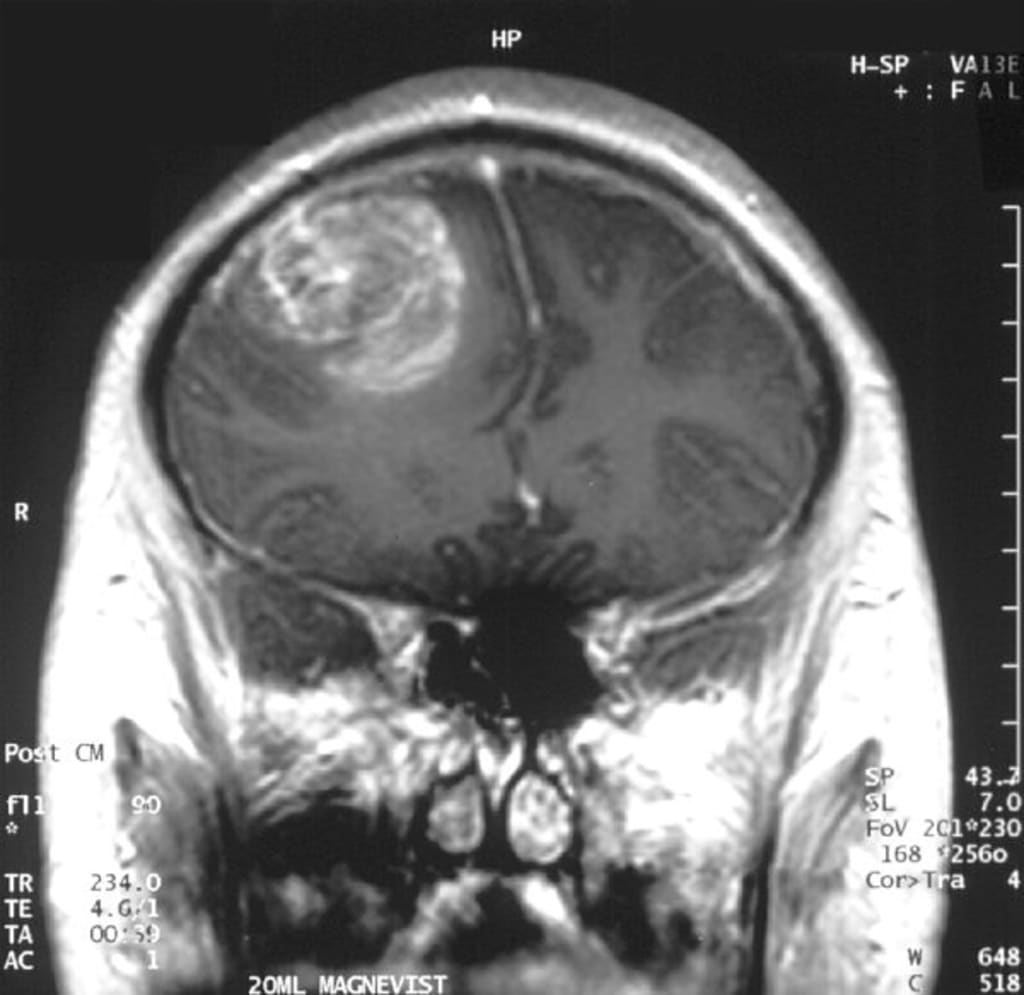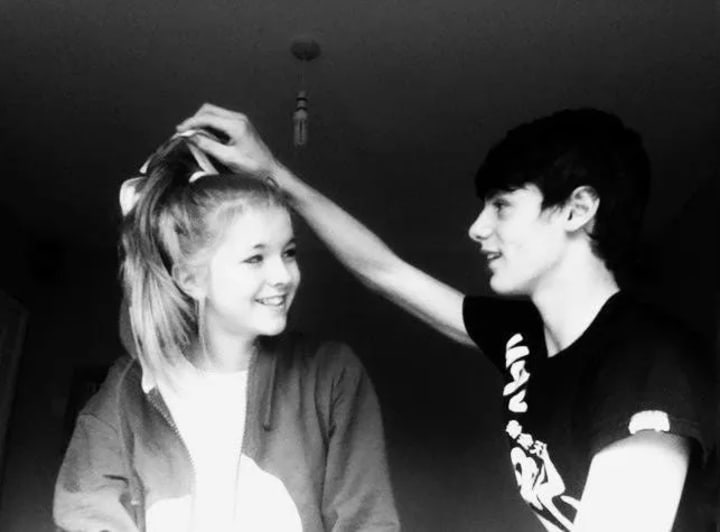What Losing My Fiancé to Brain Cancer Taught Me About Life
Lessons learned from crushing grief and adversity.

Glioblastoma. That word still scares the shit out of me.
It was a couple of years ago when we received the news. I’d been with my girlfriend, Charlotte, from the age of thirteen through to twenty. Seven years. What most people thought was just a high-school fling spanned across almost a decade of courtship, memories, and laughter.
Falling head over heels for someone is a bittersweet experience. Exhilarating highs send you soaring above the clouds — the first kiss, butterflies, and everything else that comes with love. But the bliss of those highs is always discolored by the fear of an impending fall.
My fall certainly came. Charlotte was generally well and healthy, studying to become a nurse at university when it happened. Unusual symptoms came crashing in out of nowhere. What started with stress developed into dysphasia and chronic headaches.
Then, Charlotte’s eyes became misaligned. The right side of her body started to weaken. We knew there was something seriously wrong.
After an evening of the most intense anxiety I’ve ever felt, waiting for scan results and a glimmer of hope until the early hours of the morning, a team of oncologists delivered the news.
It was brain cancer. Glioblastoma. She had eighteen months left.
Adversity is a Teacher
Now, over a year on from Charlotte’s death in the summer of 2019, I certainly feel I’ve dealt with most of the grief I faced.
Photographs and memories no longer come with the sharp sting and weighted blow that they used to. I can reminisce without falling deep into that black sorrow that pervaded all areas of my life like the web-shaped tumor that they called Glioblastoma.
I haven’t moved on completely. I’m not sure that’s even possible. Many people used to say to me that I’d never be the same after an experience like that. You’ll move forward, be happy again and carry on living, they said. But you’ll never be the same.
And in many ways, I’m not. I’m stronger. I don’t care about the small, petty things that seem to drive ordinary people into anxiety-fuelled delirium. In fact, it frustrates me when people get so pent-up over mundanities like traffic and being late.
I feel like taking them by the shoulders and screaming in their ears.
“Nobody is dying. Your family are healthy. You’re loved, secure and comfortable. So shut the fuck up about the traffic.”
I’m no longer scared, either. The woes that terrify most people in business don’t seem to phase me quite so much.
Sure, I get stressed. But that stress pales in comparison to the never-ending anxieties of 2019. Waiting at the hospital every month to find out if the love of your life is going to see another Christmas is stressful. Sleeping with one eye open in case she has a grand mal seizure at a moment’s notice is stressful.
A slight dip in this month’s earnings? That’s not stressful. It’s almost as if I feel that, since I’ve experienced my worst-case scenario, I’m prepared to take whatever else life has in store for me.
And that’s the magical thing about adversity. It shapes us. It forces us to grow up and act like adults, even if we’re just nineteen years old. And it grants us this incredible perspective on life. Anything bad that happens is rarely ever as bad as this new point of reference, and that makes it easier for us to snap out of whatever it is we’re hung up on.
It’s just a case of taking a step back and recognizing that, relative to everything else that’s happening in the world, our problem isn’t so bad.
It could always be worse. Be thankful that it isn’t.
The Good Old Days Don’t Exist
Nostalgia is a cruel mistress. It convinces us that the days gone by were far better than the ones we face today. This isn’t true.
When reflecting on the past, we tend to leaf through the crinkled, torn pages of our memories and see them as wholly imperfect. We ignore the yellowed paper and dog-eared corners, choosing to envisage our past as this idyllic story that we’d give anything to return to.
I do it, too. We all do. I look back at the days I had with Charlotte as if everything was all rosy and ideal.
There’s no doubt that those were some of the happiest memories of my life, but they weren’t perfect. I was still plagued by the many insecurities and worries I had at that age. Homelife was still in disarray. Petty drama still waged amongst my friendship group. I still felt stressed about my homework.
These might seem like minor blemishes on the canvas of life, but at the time, I know they felt huge. And that’s the thing about adversity. When you’re enveloped in it, no matter how bad it seems on the outside, to you, it feels like the end of the world.
I have countless people ask me how I managed to cope with losing a long-term partner at such a young age, and I don’t have an answer. But one thing I always tell them is that pain is relative. It doesn’t matter whether you’re dealing with loss, redundancy, or a minor argument with a friend — in your universe, it feels like hell.
Anyway, I’m digressing. But I still look back on those days as if nothing was wrong, even though some things certainly were. I had other difficulties to face, and I wasn’t as happy as my nostalgic memories would have me believe.
I don’t know why nostalgia works this way. I can’t see an evolutionary advantage to the torment that our perfect memories force us to endure. But we must recognize that this sense of perfection is false.
Don’t long to become one with your past. Seek ways to make the present better. Make today so wonderful that your nostalgic memories of it in the future are accurate.
Live for now. Forget the rest. Life is difficult, so take it one step at a time. And start here.
You Can’t Fight Anxiety
Recently, I interviewed a good friend of mine, Brian Pennie, about his experiences as a heroin addict. While Brian’s life story is astronomically different from my own, there were some commonalities there. I felt I could connect deeply with a lot of the things he was saying.
There were so many kernels of wisdom in Brian’s words, but one resonated with me more than any others.
To quote Brian:
“I still get anxious, but I have a healthy relationship with anxiety. I observe it, see it, and say ‘there you are’. Then I let it pass. And it goes. I just see it as something that’s a part of life, and I watch it come and go. I become the observer.
“I stopped fighting anxiety. Fight anxiety, and you’ll always lose.”
Many people called it scanxiety.
I’m sure you can guess what scanxiety is. It’s that feeling of enormous dread that permeates every fibre of your being as you sit in a hospital waiting room, waiting to find out of the person you love more than anyone else in this world will live to see the end of the year. Or the month. Or the week.
It’s cruel, really. There must be a better way to deliver such news than to force patients to sit drowning in a pool of their own terror amongst hundreds of others doing exactly the same. That’s not up to me, though.
I’ve never felt nerves like those. Violent shaking, stomach aches, and an inability to sit still. It’s the worst I’ve ever felt, hands-down.
There were many experiences during that year that caused the same level of anxiety, on reflection. The worst was when Charlotte was admitted to hospital with pneumonia whilst we were on holiday in St Ives.
Pneumonia is a deadly illness in itself. But for a chemotherapy patient, it’s another level. It can kill them within hours.
Watching her struggle for breath, screaming for help, and crying endlessly in that hospital bed is an image I’ll never be able to erase from my memory. Even now, it brings tears to my eyes. I’d felt anxiety before, but never like this.
I was a wreck. And yet, in spite of myself, I still tried to fight it. We often do. Feelings of anxiety arise and we say no, go away, not now. But as Brian said so perfectly, if you fight anxiety, you’ll always lose.
Now, I let such feelings come and go. I still get nervous. But rather than trying to stop those feelings I just enable them to do their thing.
I learned that it’s okay to be afraid. As you’ve been told before, you don’t always have to be strong. So maybe it’s time to start telling yourself.
Acts of Love Are Acts of Love
Caring for a terminally ill person is one of the most difficult things a person can experience. It’s exhausting, heartbreaking, and will test you to your absolute limit.
I found myself on the brink of a meltdown so many times. Thankfully, I never crossed that border. But I was close. Living with Charlotte and her family, I’d return home to my mum and brother from time to time, expressing that I simply couldn’t handle these feelings anymore. It was going to kill me.
My heart never stopped racing. I’d wake up with the heaviest sense of dread every morning. I was constantly on alert, fearful that Charlotte might have a seizure or fall and hurt herself. I couldn’t relax, no matter how much I meditated, drank camomile tea, or read books.
There were times when I couldn’t envisage carrying on any longer. But I did. I persevered. And Charlotte’s last words to me made it all worth it.
Just a few weeks before her death, she was being moved into hospice care. Since the doctors had exhausted all of their options for prolonging her life, it was time to make her comfortable, pain-free and allow her to exit this world as peacefully as possible.
Some nights before Charlotte was moved, her mum asked if I’d like to stay with Charlotte in the hospital for an evening. So I did.
It’s not easy sleeping in those hospital beds. Especially not when there are lights everywhere, nurses running up and down the corridor, and constant beeping sounds. Charlotte managed, of course. She was exhausted, and falling asleep on command was a gift of hers that I always envied.
That night, just when I thought she was falling asleep, she called my name.
“AJ,” she said.
“Thank you so much for being there for me. You didn’t have to stay throughout all of this. You could’ve left and you didn’t. I don’t know what I’d have done if you did. Thank you. I love you.”
That was it. That’s what made it all worth it. The pain, the sorrow, the anxiety — all of it. Pushing past those moments of being on the brink of a mental breakdown. I’d done it all for Charlotte.
And that’s the thing about acts of love. We do them simply because we care so deeply about the person receiving them. We do them not for ourselves, or anybody else, but simply because we love them. Simply because we want to see that beautiful smile on their face and the glimmer in their eyes.
I’ll hold those words with me until the day I die. They remind me that I did it all to see Charlotte happy. And at that moment, I realized that I’d succeeded.
Closing Thoughts
It would be wonderful if we could learn the lessons that adversity teaches without going through the pain of it all. But I don’t think that’s possible.
Despite our losses, what we gain through grief is profound wisdom. I don’t say that in an egotistical sense. I don’t consider myself some all-knowing oracle that’s been gifted with knowledge that others lack. Rather, I know that I learned a lot of important lessons through my experiences with grief.
Wherever you are in life at this point, whether in a similar position or you’re just preparing yourself for future hardships, know this. It gets easier. You’ve heard that before, but it does. People are right.
Time heals, and it heals well. The cuts that sting to touch today will become scars that protect you from the pain in the future.
Adversity is a teacher. A cruel, masochistic teacher, but the best you’ll ever have. So let it teach you. Take whatever you can from it in exchange for the sorrow, anxiety, and grief that it inflicts.

You won’t be the same once the storm passes. But perhaps that’s a good thing. Maybe the changes you endure will be for the better in some ways.
You might be lost at sea. But someday, you’ll float back to the shore. And once you get there, you’ll reflect on the tumult and the sorrow with a bittersweet smile on your face, thankful for the memories, and proud of yourself for making it out to the other side.
That’s what I’m doing as I write these words. And I know that Charlotte is smiling right back at me.
This story was originally published by me on Medium.
About the Creator
Enjoyed the story? Support the Creator.
Subscribe for free to receive all their stories in your feed. You could also pledge your support or give them a one-off tip, letting them know you appreciate their work.





Comments
There are no comments for this story
Be the first to respond and start the conversation.